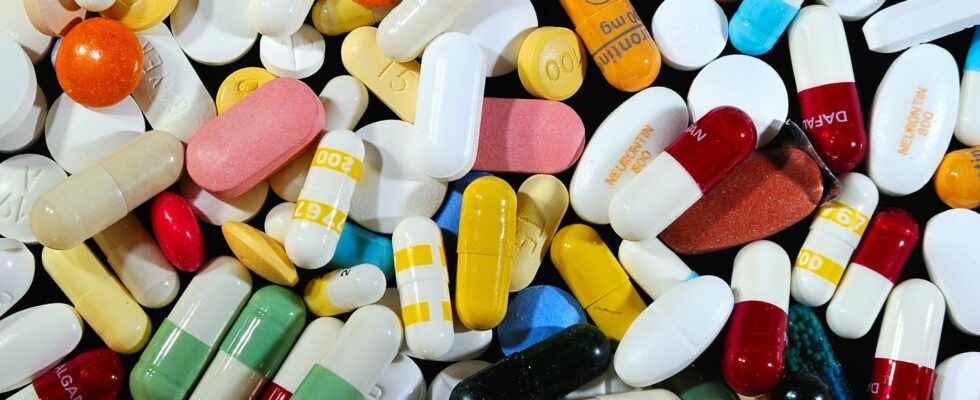Will the surge in contamination linked to Covid-19 in China worsen the shortage of paracetamol and painkillers? In order to meet the needs of its population, Beijing has requisitioned certain factories and limited drug exports. “In addition to being in short supply itself, China is encountering production problems, via the stoppage of supply chains”, indicates to L’Express Anne Sénéquier, director of the global health observatory at the Institute of International and Strategic Relations (IRIS). Pediatric drugs are concerned, in particular paracetamol and amoxicillin. No less than “80% of the active ingredients, the raw material for our medicines, are manufactured in China and India”, recalls Rémi Salomon, president of the conference of presidents of the medical commissions of the CHUs.
Over the past thirty years, France has relocated the production of many drugs to the countries of Southeast Asia. “For Doliprane, the active ingredient is manufactured in Asia, then the packaging of this active ingredient (excipient then packaging) is done by manufacturers all over the world”, explains Anne Sénéquier. But the drug production machine is jammed, since France has been experiencing strong supply tensions for pediatric drugs and paracetamol for several weeks. “Legally, manufacturers must keep two months of stocks. But this is not applied by all”, underlines the specialist. The health crisis linked to Covid-19 and the collateral effects of the war in Ukraine, in particular on the design of glass, cardboard and aluminum, necessary for the packaging of medicines, have undermined the production chain.
Added to the global upheavals is a lack of anticipation on the part of manufacturers concerning the production of certain drugs, Rémi Salomon says: “These last two winters, there have been fewer epidemics because people respected the gestures As a result, the pharmaceutical companies that made these drugs closed some production lines seeing that the demand was less strong, except that it takes between three and four months to reopen them.” Another argument advanced to explain the shortage of drugs in France: the energy crisis, “the manufacture of antibiotics consumes a lot”, he explains.
“One antibiotic is not equivalent to another”
What are the consequences for the French patient? The leader of a large pharmaceutical company entrusted to Echoes, on December 21, that he feared effects on the French supply of paracetamol and ibuprofen within a month. If the Chinese situation brings the question of drug shortages back to the fore, institutions have been on the alert for several weeks. In October, the National Medicines Safety Agency (ANSM) invited pharmacists and doctors to limit the consumption of paracetamol. Anne Sénéquier recalls that it is possible to find palliatives for Doliprane, such as Efferalgan, if you want to lower the fever. “For the pediatric forms, the most affected by the shortages, it is possible to ask the pharmacists to make adjustments compared to the other galenics available. But we do not do it ourselves!”, She continues.
A possible out of stock of amoxicillin, which represents two thirds of the pediatric antibiotic prescription, could however be more problematic. Especially since stocks this winter are shrinking because of the current triple epidemic – bronchiolitis, Covid-19, flu. “Concerning amoxicillin, some pediatric forms are already missing, so we have to manage with adult forms,” says Rémi Salomon. On this subject, a series of recommendations has been published on the ANSM website. If ever the adult forms were to run out, it would be complicated to replace them with another drug. “One antibiotic is not equal to another, it has a very specific spectrum of activity. Despite this, other antibiotics may work, but then it will be less specific to this bacterium, or will have a broader spectrum… And will be therefore more likely to generate antibiotic resistance”, insists Anne Sénéquier.
While the threat of a drug shortage is not new in France, Rémi Salomon points the finger at the responsibility for past political choices. In particular the strategy of relocation operated for twenty years, making the country dependent on the giants of Asia: “France produced a lot more drugs at the end of the 20th century, but it cost less to have them produced elsewhere.” Also, the chemical industry is very polluting, as Antoine Flahault, director of the Geneva Institute of Global Health, reminds us in one of his tweets: “Regaining independence from China for the production pharmaceutical industry will be complex. It will not only be a question of labor costs but also of the environment.”
Offshoring is also explained by the lack of profitability of generic drugs, which have lower selling prices. This is what led to the relocation of the last French paracetamol production workshop in 2008. Last December, Germany decided to increase the prices of certain pediatric drugs, in order to encourage the production of molecules in Europe. “I am not convinced by the rise in prices. Medicines are not commercial products like the others. A Nation must be able to ensure the supply of medicines of major therapeutic interest, whatever it happens”, concludes Rémi Salomon. But can she afford it?
